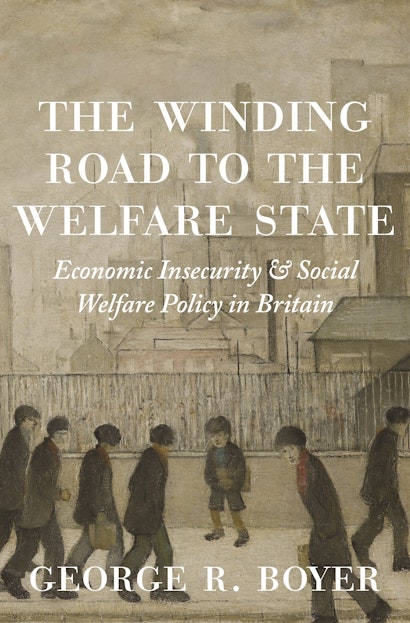How did Britain transform itself from a nation of workhouses to one that became a model for the modern welfare state? The Winding Road to the Welfare State investigates the evolution of living standards and welfare policies in Britain from the 1830s to 1950 and provides insights into how British working-class households coped with economic insecurity. George Boyer examines the retrenchment in Victorian poor relief, the Liberal Welfare Reforms, and the beginnings of the postwar welfare state, and he describes how workers altered spending and saving methods based on changing government policies.
From the cutting back of the Poor Law after 1834 to Parliament’s abrupt about-face in 1906 with the adoption of the Liberal Welfare Reforms, Boyer offers new explanations for oscillations in Britain’s social policies and how these shaped worker well-being. The Poor Law’s increasing stinginess led skilled manual workers to adopt self-help strategies, but this was not a feasible option for low-skilled workers, many of whom continued to rely on the Poor Law into old age. In contrast, the Liberal Welfare Reforms were a major watershed, marking the end of seven decades of declining support for the needy. Concluding with the Beveridge Report and Labour’s social policies in the late 1940s, Boyer shows how the Liberal Welfare Reforms laid the foundations for a national social safety net.
A sweeping look at economic pressures after the Industrial Revolution, The Winding Road to the Welfare State illustrates how British welfare policy waxed and waned over the course of a century.
George R. Boyer is professor of economics and international and comparative labor at Cornell University. He is the author of An Economic History of the English Poor Law, 1750–1850.
"One of the book’s great strengths is the way in which is seeks to integrate the history of social policy with the history of living standards more generally, and the book is enhanced by the author’s efforts to place both living standards and social protection in an international context. - Bernard Harris"—Journal of Economics
"An important, and useful, addition to the literature on the history of social welfare in modern Britain."—John Stewart, Journal of Social Policy
"The Winding Road to the Welfare State represents a major contribution to the study of more than a century of British social and economic history, and has important implications for the debates on contemporary welfare and redistribution policy in the West."—Stanley Engerman, professor emeritus, University of Rochester
"A well-written and persuasive account of complex crosscurrents in the economic, social, and political history of Great Britain, The Winding Road to the Welfare State reminds us that economic insecurity is still with us, as seen through the rise of the gig economy and hostility to skivers. Politicians who seek answers should read this book."—Roderick Floud, former provost of Gresham College, London
“George Boyer offers a critical reappraisal of the rise of the welfare state in this deep study of economic insecurity, political voice, and poor relief policy in Britain. Boyer’s innovation is to study living standards and social policy together, arguing persuasively that neither can be understood absent the other. What he calls the ‘amazing persistence’ of economic insecurity is rendered entirely understandable by the vast trove of economic, political, and social evidence he subjects to his perceptive analytic lens.”—Anne E. C. McCants, Massachusetts Institute of Technology
"In this book, George Boyer convincingly maps and explains the twists and turns of income shocks and British social policy from the Industrial Revolution to the postwar welfare state. After lagging behind other countries in the building of safety nets, Britain became a social-policy leader only when changes in political voice and public opinion permitted it."—Peter Lindert, University of California, Davis


